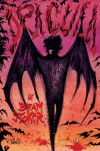Currently reading
The Last Picture Show (Mass Market)
Dracula
Ludwig Wittgenstein: The Duty of Genius
The Portrait of a Lady
Maigret et le marchand de vin
Le Rouge et le Noir
 Like Nostromo, the pacing of this is slowish in the first half and picks up in the second half. Unlike Nostromo there is much less back-story in this novel. While the father of the main character is discussed and is important although dead, most of the rest of the characters have a history only within the scope of the story.
Like Nostromo, the pacing of this is slowish in the first half and picks up in the second half. Unlike Nostromo there is much less back-story in this novel. While the father of the main character is discussed and is important although dead, most of the rest of the characters have a history only within the scope of the story.One thing that came to me strongly was an echoing of "The Tempest". Particularly the characters Pedro and Wang seemed to be sort of inverted images of Calaban and Ariel.
This story is another one fraught with racial images. I have a difficult time making sense of what is to be said on this score, but I think it must be admitted that Conrad means to confront the issue. The parallel with "The Tempest" seems relevant given the reading of that play (reasonable to my mind) that it at least in one dimension concerned with racial relationships or more particularly colonialism. Furthermore, at one point Jones (a villian) says to Heyst (main character) "Do you believe in racial superiority, Mr. Heyst? I do, firmly." Furthermore, the main character is referred to constantly as "that Swede" by his nemesis Schomberg. It is emphasized by Conrad that this word is used in a pejorative sense. (I admit that on the surface this can be read as a merely national rather than racial difference but I'm not sure how much rides on that). Much is made of the irony of the whites who hold themselves in superiority to natives or hold them of no account. Both Schomberg and Ricardo make much of their own whiteness, and both are ironically so.
On the other hand, it also seems true that the characters of any race other than white are portrayed as less civilized. Morrison's clients are objects of charity, Pedro is a half-man savage, the Portuguese are corrupt, Wang abandons Heyst and takes it as a point of pride to deny taking the revolver despite the fact that he obviously has. The people on the other side of the island are savages of a sort who block out society.
But even here these are not so obvious. Heyst laughs at the naivete of Lena when she asks if all Chinese have this mysterious ability to materialize silently. There is also a certain logic to Wang's abandonment of Heyst, in that Wang is married to a local girl and his relationship with Heyst was never portrayed as much other than a matter of practicality. It must be noted however that Wang's theft of the revolver pretty squarely sets him at a lower moral level, as well as his reliance on violence. The question is whether this is meant to reflect a sort of hierarchy of the races or whether it is just that Wang represents a certain sort of moral attitude that could for Conrad have been represented by a white man but that the social context of the story makes the character more convenient to represent by a Chinese.
Furthermore, I think Jones being an inverted Heyst, both being highlighted as of upper class, or gentlemen, is a related question. It seems clear that Jones is a gentleman by birth who is not so in truth. Whereas it seems that Heyst isn't really a gentleman by birth, although he is said to be one, but is very much one by his nature.
I think as far as I can take it right now, it has to be said that Conrad clearly means to confront the question of race, and that his reply to this question is not a simple one. On the other hand, I can also see that it might be possible to see him as presenting a sort of hierarchy of the races and a kind of "white man's" burden take on the moral relationships between them. I am not arguing that this is in fact the case, only that in so far as I can see it at this point this is consistent with what I have seen of his writing. On the other hand I must admit that as it stands now this seems to be the most likely, and that this does diminish to some degree my enjoyment of his work, although I still have a lot of respect for him as an author and still intend to read more of his books.
Notes on this edition: There's a cool map at the beginning showing the locations of many of Conrad's stories and novels. There are many annoying footnotes. Notes seem a little silly to me in the first place and often they are inflated and absurd, but actually indicating the notes with little numbers in the text of a novel is just ugly and annoying.









